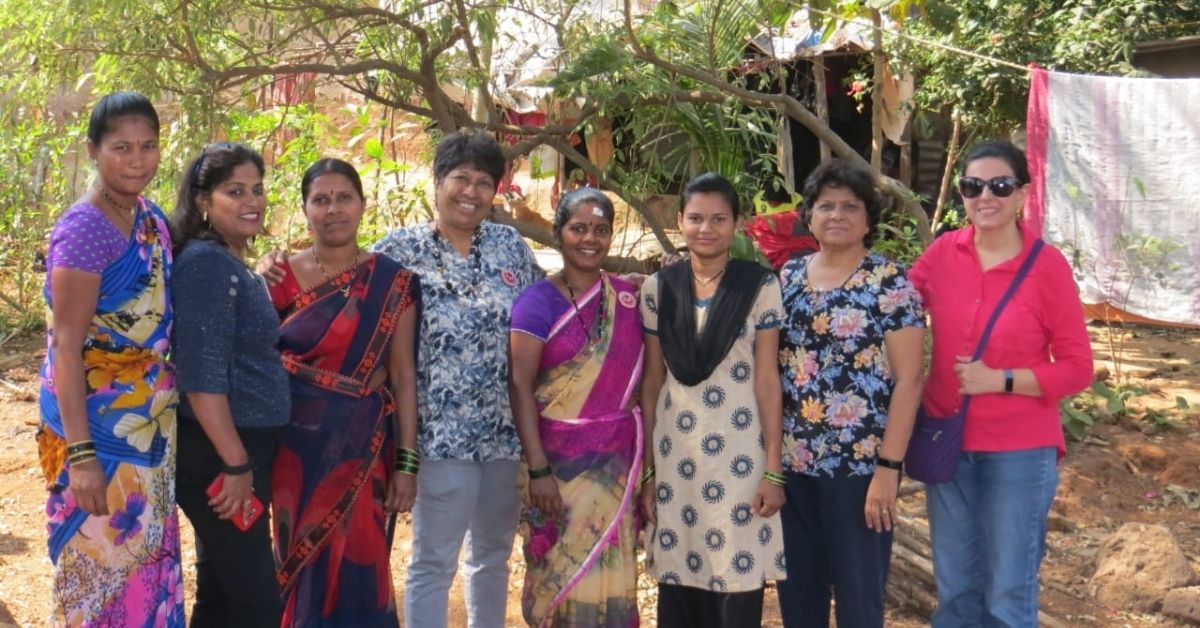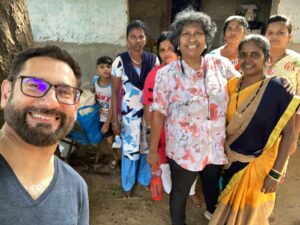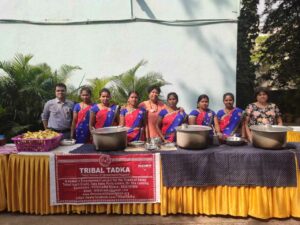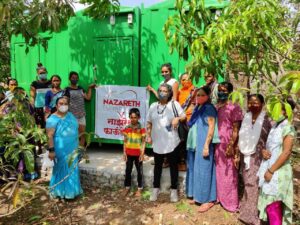Biotoilets to Borewells: How One Mumbaikar Is Helping 2500 Warli Tribal Families
Cassandra Nazareth, along with her team, has been driving impact for the betterment of tribal communities in Aarey Forest and Madh Island.

For Cassandra Nazareth, a social mentor from Mumbai, her passion is deeply rooted in working with the tribal communities in and around the city. This is reflected in the work she has done for their upliftment. “I went into Aarey Forest to save the trees,” says Cassandra, recounting how she discovered the Warli villages that were deep in the forest. In contrast to the city’s developments, she noticed these had been left behind. This ignited the fire to do work towards the betterment of the tribals.
For the past six years, Cassandra along with her team of three others, Blasia Pinto, Mahesh Bariya, and Rita Newnes has been helping 2,500 families across 13 Aarey villages and 1,200 families across four villages of Madh Island. “We help these Adivasi Warli women in Aarey and around Mumbai improve their lives and become self-reliant,” she says.

Facing Dangers Of Urbanisation
As the city has evolved and expanded, the tribal communities in Aarey are still in the very root stages. Living in small hamlets dispersed around the forest, rearing poultry for a living and growing crops, these ethnic groups live a self-sufficient albeit isolated life.
Cassandra, who is also the Trustee of the Nazareth Foundation that works for the empowerment of these ethnicities, believes that with the right voice of activism these neglected communities can move towards becoming financially independent and increase their standard of living.
“These groups are slowly being pushed onto the edges of society. They are losing their land, livelihood, culture to ever-increasing urbanisation,” she says. “Their sheltered community life and social mores have been exposed to a lifestyle mirrored in smartphones and the internet. As a result, there have been increasing cases of mental health deterioration, suicides and teen pregnancies.”
For this Mumbai dweller, awareness is not the only route she takes to help the communities stand on their feet. She facilitates an engagement of Mumbaikars with these ethnicities, thus causing an amalgamation of culture, and a give and take on both sides. “We have an ongoing programme called #TRibalLunch where we coax Mumbaikars into coming to Aarey Forest — the world’s only natural Urban Forest, and to see what a gem they have amidst their city. The women cook a meal in their traditional style.”

#TRibalTAdka is the revenue-generating income model, whereby the women earn from selling food, organic produce, and handicrafts and Mumbaikars can get a first-hand experience of the authentic Maharashtrian cuisine right in the heart of the forest, and in one of the village homes. A truly bonafide experience!
Asked about how these lunches have benefited the community, Surekha Burkud, one of the women from the Warli community in Aarey who has cooked and been part of the lunch experience, says, “Yeh jo hota tha, voh hamare parivaro ke liye bohot accha tha (This used to help our families a lot). She adds, “The lunches have helped us get income and through this, we can support our families with food, water, clothes, and sometimes even saris for ourselves. Before this, no one did anything for us. We have also got facilities of electricity, water, borewells, etc.”
Revolutionising Tribal Lives
Another change that the group has been instrumental in bringing about is the installation of bio-toilets in eight villages in Aarey Forest and Madh Island. These toilets eliminate the need for septic tanks, and a single one can be accessed by eight families. A total of 45 of these bio-toilets each costing around Rs 55,000 have been installed, claims Cassandra. “These have limited the human-animal conflict as leopards are prevalent in the area and there would often be reports of women and children being attacked when they were on their way to attend nature’s call.”

The Nazareth Foundation has also crowd-funded and got 11 domestic flour mills, each costing Rs 20,000 for the village women which eases their previous 2.5 km walk to the nearest flour mill.
Self-reliance is what this social activist has tried to achieve through her work with ethnic groups. “Today, most have PAN cards and their own bank accounts. We have helped them here via our #ProjectRoots which attempts to teach the younger generation village folk Warli Art.”
Right from medical help to literacy to even computer knowledge, various domains are looked after by the team.
In addition to the above, Cassandra’s team and their angst against the standard of living that these tribes had to endure, compelled massive change. Through crowdfunding and Government cognizance, the group has managed to get 23 zig-zag sewing machines costing Rs 8,000 each, smokeless stoves for over 2,500 families, 350 menstrual cups through the #SurekhaMenstrualCupProject.
During the pandemic and lockdown, as Mumbai shut down, Cassandra opened her doors and stepped out to see that these communities were not left isolated. “Through the #CovidLockdownFoodProjects, we crowdfunded food grains, veggies totalling over Rs 60 lakh,” she says. Additionally, during the severe cyclone Tauktae that hit the West Coast of India in May 2021, the group crowdfunded Rs 1.6 lakh tarpaulins for SGNP, Aarey and Madh Island along with distribution of staples.
Still, Cassandra believes there are miles to go before they can consider it an achievement or significant development in rural lives. “I hope to be able to empower the women to sell their products directly in stores or through online portals and to form a full-fledged Warli catering service or a food truck,” she says.
Edited by Yoshita Rao

Similar Story

Laundromats in India? Couple Built Rs 100 Crore Biz Washing Dirty Linen Across 100 Cities
Faridabad’s Arunabh Sinha and his wife Gunjan Taneja launched UClean in 2017 to set up an organised laundromat service in India. Currently, they are spread across 100+ cities and have 350+ outlets across the country.
Read more >
If you found our stories insightful, informative, or even just enjoyable, we invite you to consider making a voluntary payment to support the work we do at The Better India. Your contribution helps us continue producing quality content that educates, inspires, and drives positive change.
Choose one of the payment options below for your contribution-
By paying for the stories you value, you directly contribute to sustaining our efforts focused on making a difference in the world. Together, let's ensure that impactful stories continue to be told and shared, enriching lives and communities alike.
Thank you for your support. Here are some frequently asked questions you might find helpful to know why you are contributing?


This story made me
-
97
-
121
-
89
-
167












